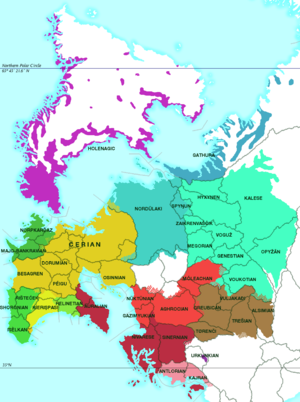Íscégon
| Íscégon | |
|---|---|
| cérosiu íscégunús | |
| Pronunciation | [[Help:IPA|ˈkeːrosju iːsˈkeːɡunuːs]] |
| Created by | Lili21 |
| Date | Mar 2017 |
| Setting | Calémere |
| Ethnicity | Iscegons |
| Extinct | ca. 700 |
Evandorian languages
| |
The Íscégon language, natively cérosiu íscégunús [ˈkeːrosju iːsˈkeːɡunuːs], is an Evandorian language, the main Classical language in the Western civilizations of Calémere.
First spoken in central Évandor, in present-day Northern Ceria, where it developed from Proto-Common Evandorian, it was the language spread across most of the continent by the ancient Íscégon Empire; for a long time after imperial times it still was the main language of culture of the whole continent and nowadays it still has - along with ancient Nivarese, the language of ancient Nivaren - an important role in learned terminology in all Evandorian civilizations and, through influence of Cerian (Ísc.: Ciairegiion; Cer.: Čérízon), a descendant of Íscégon which has become through colonization the lingua franca in most of Calémere, in most languages of the planet.

As a Central Evandorian language, Íscégon shares many features with Ancient Quanarian (like definiteness of nouns expressed in verbs, only found in Central Evandorian and in Auralic (Southern)) as well as with most other languages of the family (except for the most divergent ones like Holenagic and to a lesser extent the Northern Evandorian languages), like the two-gender system, the lack of verbs declining for person, and SVO word order. However, unlike other Central Evandorian languages (but like most other Evandorian ones), it has lost the vowel harmony characteristic of Proto-Evandorian, in the Íscégon case for a large number of vowel changes, mergers, and insertions that disrupted the original vowel harmony (cf. PEv *kerɁ–ưjs > Ísc. cérosiu "language"), as well as borrowings from other languages, notably Proto-Western-Evandorian (cf. PEv *srưbaŋ "wine" > PWE *šɯrbən, borrowed as Ísc. sierben or siorben "nectar", cf. the inherited word ruban "wine").
Introduction
Phonology
Orthography
Consonants
| → PoA ↓ Manner |
Labial | Labiodental | Alveolar | Palatal | Velar | Labiovelar | Glottal |
|---|---|---|---|---|---|---|---|
| Nasals | m | n | |||||
| Plosives | p b | t d | k ɡ | kʷ | |||
| Fricatives | f | s | h | ||||
| Approximants | ʋ | j | |||||
| Trill | r | ||||||
| Lateral | l |
Clusters of stop/fricative + /j/ often have varying results due to allophony (probably in Late Íscégon only (roughly after year 200)):
- /pj bj fj/ → [pj bj fj]
- /tj dj sj/ → [tʲ dʲ ʃ]
- /kj ɡj/ → [tʃ dʒ]
- /hj/ → [ç]
Vowels
| Front | Central | Back | |
|---|---|---|---|
| High | i iː | u uː | |
| Mid | e eː | o oː | |
| Low | a aː |
Prosody
Stress
Intonation
Phonotactics
Íscégon phonotactics are rather simple, especially by Evandorian languages' standards, as the syllable structure is (C1(C2))V(C3). C1 may be any consonant; C2 may be /r/, /ʋ/, or /j/ (but only after a stop or fricative (and /sr/ is not possible anyway)), or /s/ after one of /p t k/, and C3 may be one of /m n s r l/. The vowel may be short, long, or a falling diphthong.
Íscégon phonotactics are one of the easiest noticeable differences with its most famous daughter language, Cerian, where the maximum syllable structure is strictly CVn — something that can often be easily seen by comparing an Íscégon word with its Cerian descendant, e.g. Isc. irnéma (city), épsis (person) → Cer. ínéma (city), euší (person, human).
Morphophonology
Morphology
Nouns
Syntax
Constituent order
Noun phrase
Verb phrase
Sentence phrase
Dependent clauses
Vocabulary
Among older Evandorian languages, Íscégon is notable as it displays many loanwords from other branches of the family, especially Ancient Nivarese loans in a later period but, right from the earliest attestations, many words taken from Proto-Western-Evandorian, due to the fact that Íscégon speakers (and to a lesser extent also Quanarians and other Central Evandorian peoples) had moved and settled into Western Evandorian lands, something that can still be seen today, as Western Evandorian languages are spoken only in the extreme peripheries of Western Evandor, most of that area being Central Evandorian-speaking. Perhaps one of the most notable doublets is how the (Late) Proto-Evandorian word for "person", *Ɂʷips–tis, kept its meaning in Íscégon (épsis) as in Proto-Western-Evandorian (*kʷištɯš), but the latter word was borrowed into Íscégon as the word for "foreigner" (quistos). Other such doublets are iertis "house" < PEv *dert–tis > PWE *dešč > desix "military camp", or ductus "blade" < PEv *duk–tưs > PWE *dučɯš > duxios "axe". For *dert-tis, also note the further cognate, Ancient Nivarese borrowing, diritis "awareness, consciousness".